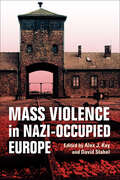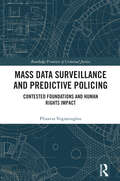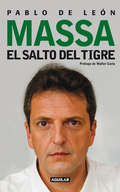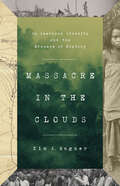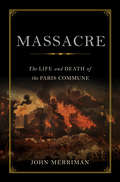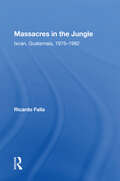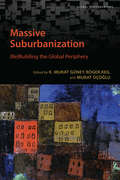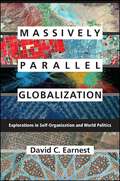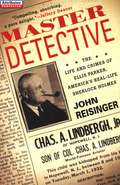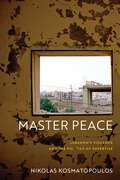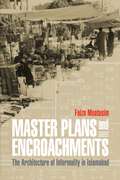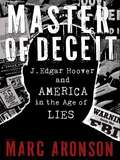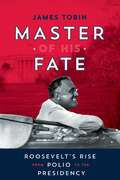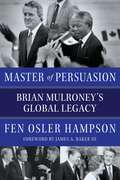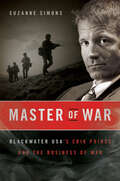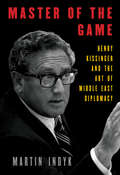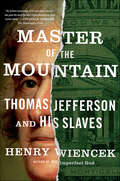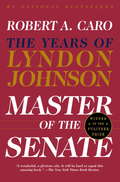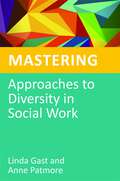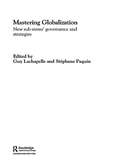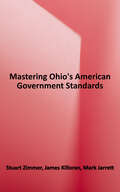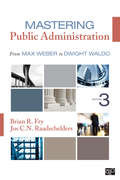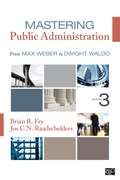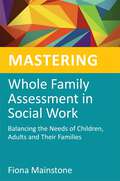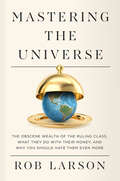- Table View
- List View
Mass Violence in Nazi-Occupied Europe
by David Stahel Alex J. KayThis scholarly anthology explores the violence perpetrated by Nazi Germany, shedding new light on its staggering scale and scope.Mass Violence in Nazi-Occupied Europe argues for a more comprehensive understanding of what constitutes Nazi violence and who was affected by this violence. The works gathered consider sexual violence, food depravation, and forced labor as aspects of Nazi aggression.Contributors focus in particular on the Holocaust, the persecution of the Sinti and Roma, the eradication of “useless eaters” (psychiatric patients and Soviet prisoners of war), and the crimes of the Wehrmacht. The collection concludes with a consideration of memorialization and a comparison of Soviet and Nazi mass crimes.
Mass data surveillance and predictive policing: Contested Foundations and Human Rights Impact (Routledge Frontiers of Criminal Justice)
by Plixavra VogiatzoglouThis book critically assesses legal frameworks involving the bulk processing of personal data, initially collected by the private sector, to predict and prevent crime through advanced profiling technologies. In the European Union (EU), mass data surveillance currently engages three sectors: electronic communications (under the e-Privacy Directive), air travelling (under the Passenger Name Records Directive), and finance (under the Anti-Money Laundering Directive), and increasingly intersects with the deployment of predictive policing techniques. The book questions the legitimacy and impact of these frameworks in light of the EU’s powers to provide security while safeguarding fundamental rights, particularly privacy, data protection, e-ective remedy, fair trial, and presumption of innocence.Focusing on the security shift towards forestalling crime before it occurs, the book identifies its distinct characteristics, such as the blurred lines between the public and private sector actors, and interrogates whether the legal bases and traditional theories on security can account for it. The book further explores the challenges these pre-crime practices pose, including their questionable e-ectiveness and the ambiguous application of human rights safeguards in situations where no crime has been committed, yet individuals face consequences as a result of deploying predictive analytics on mass amounts of commercially collected personal data. In examining the interference with several fundamental rights, the book also highlights aspects neglected by the jurisprudence of the Court of Justice of the European Union and the European Court of Human Rights, such as the expansive nature and the collective and cumulative e-ects of these frameworks.
Massa. El salto del Tigre
by Pablo De León¿Quién es Sergio Massa? ¿Cómo ha llegado a emerger como figura en el mapa político nacional este joven intendente de poco más de cuarenta años? "Sobre una contradicción -un oxímoron, en retórica- Sergio Massa construyó en unas pocas semanas un proyecto que ha puesto en riesgo por primera vez la hegemonía de una década de kirchnerismo. Para este desafío le alcanzó apenas con plantear una incerteza en una época de absolutos", afirma Walter Curia en el prólogo a este libro. El periodista Pablo de León investigó y siguió de cerca al personaje para develarnos su origen y sus conexiones, su intimidad y su exposición pública y política, analizando sus vínculos con el poder. «Este libro de Pablo de León es el primer intento desde el periodismo por despejar las incógnitas del fenómeno Sergio Massa, el peronista que liderando una oposición blanda y con una retórica conciliadora se trepó al escenario político para disputar el poder a Cristina Kirchner.»Walter Curia
Massacre in the Clouds: An American Atrocity and the Erasure of History
by Kim A. WagnerIn this &“forensic, unflinching, devastating work of historical recovery&” (Sathnam Sanghera), Bud Dajo—an American atrocity bigger than Wounded Knee or My Lai, yet today largely forgotten—is revealed, thanks to the rediscovery of a single photograph. In March 1906, American soldiers on the island of Jolo in the southern Philippines surrounded and killed 1000 local men, women, and children, known as Moros, on top of an extinct volcano. The so-called &‘Battle of Bud Dajo&’ was hailed as a triumph over an implacable band of dangerous savages, a &“brilliant feat of arms&” according to President Theodore Roosevelt. Some contemporaries, including W.E.B. Du Bois and Mark Twain, saw the massacre for what it was, but they were the exception and the U.S. military authorities successfully managed to bury the story. Despite the fact that the slaughter of Moros had been captured on camera, the memory of the massacre soon disappeared from the historical record. In Massacre in the Clouds, Kim A. Wagner meticulously recovers the history of a forgotten atrocity and the remarkable photograph that exposed its grim logic. His vivid, unsparing account of the massacre—which claimed hundreds more lives than Wounded Knee and My Lai combined—reveals the extent to which practices of colonial warfare and violence, derived from European imperialism, were fully embraced by Americans with catastrophic results.
Massacre: The Life and Death of the Paris Commune
by John MerrimanThe Paris Commune lasted for only 64 days in 1871, but during that short time it gave rise to some of the grandest political dreams of the nineteenth century—before culminating in horrific violence. Following the disastrous French defeat in the Franco-Prussian War, hungry and politically disenchanted Parisians took up arms against their government in the name of a more just society. They expelled loyalists and soldiers and erected barricades in the streets. In Massacre, John Merriman introduces a cast of inimitable Communards—from les pétroleuses (female incendiaries) to the painter Gustave Courbet—whose idealism fueled a revolution. And he vividly recreates the Commune’s chaotic and bloody end when 30,000 troops stormed the city, burning half of Paris and executing captured Communards en masse. A stirring evocation of the spring when Paris was ablaze with cannon fire and its citizens were their own masters, Massacre reveals how the indomitable spirit of the Commune shook the very foundations of Europe.
Massacres In The Jungle: Ixcan, Guatemala, 1975-1982
by Ricardo FallaBetween 1975 and 1982 the Guatemalan military systematically and sadistically punished the campesino population for the activities of guerrilleros in their region. This account by Ricardo Falla, an anthropologist and Jesuit priest who is himself a Guatemalan exile, shows how the victims and their communities were destroyed and provides a detailed record of assassinations and disappearances. The book also bears witness to the work of Catholic priests who are dedicating themselves to improving the lives of the peoples of Central America.
Massive Suburbanization: (Re)Building the Global Periphery (Global Suburbanisms)
by Roger Keil K. Murat Guney Murat UcogluProviding a systematic overview of large-scale housing projects, Massive Suburbanization investigates the building and rebuilding of urban peripheries on a global scale. Offering a universal inter-referencing point for research on the dynamics of "massive suburbia," this book builds a new discussion pertaining to the problems of the urban periphery, urbanization, and the neoliberal production of space. Conceptual and empirical chapters revisit the classic cases of large-scale suburban building in Canada, the former Czechoslovakia, France, Germany, and the United States and examine the new peripheral estates in China, Egypt, Israel, Morocco, the Philippines, South Africa, and Turkey. The contributors examine a broad variety of cases that speak to the building or redevelopment of large-scale peripheral housing estates, tower neighbourhoods, Grands Ensembles, Groβwohnsiedlungen, and Toplu Konut. Concerned with state and corporate policy for building suburban estates, Massive Suburbanization confronts the politics surrounding local inhabitants and their "right to the suburb."
Massively Parallel Globalization: Explorations in Self-Organization and World Politics (SUNY series, James N. Rosenau series in Global Politics)
by David C. EarnestIn this era of globalization, people organize into fluid, adaptive networks to solve complex problems and provide resources that nation-states cannot. Examples include the Grameen Bank, mHealth, and the Ushahidi open source software project. Why do these networks succeed where nation-states fail? Only recently have social scientists developed tools to understand exactly how these complex networks self-organize, emerge, adapt, and solve collective problems. Three of these tools—agent-based modeling, social network analysis, and evolutionary computing—are converging in a field known as computational social science. In this provocative book, David C. Earnest discusses how computational social science helps us understand "massively parallel globalization." Using "explorations" of global systems ranging from fisheries to banking, Earnest illustrates the promise of computer models for explaining the surprises, cascades, and complexity that characterize global politics today. These examples of massively parallel globalization contrast sharply with the hierarchical and inflexible governmental bureaucracies that are poorly suited to solve many of today's transnational and global challenges.
Master Detective: The Life and Crimes of Ellis Parker, America's Real-Life Sherlock Holmes
by John Reisinger"Fascinating reading for true-crime buffs and mystery fans alike. " --Max Allan Collins Known as the greatest detective in the world, Ellis Parker was the "American Sherlock Holmes" who solved ninety-eight percent of the murders he pursued. Yet his illustrious forty-year career ended tragically in prison, where he died on the very eve of certain Presidential pardon. Here is a riveting account of the ultimate sleuth, a man who solved his first crime as a teen by nabbing the thief who stole his father's horse and buggy. Drawing on the emerging discipline of psychology and his uncanny deductive skills, Parker was a "profiler" long before the term existed, and often apprehended criminals without ever leaving his desk! Then came the kidnapping of Charles Lindbergh's baby son in 1932. From that moment things began to go wrong--terribly wrong--as Parker pushed himself past the bounds of law in pursuit of the truth. A fascinating look at America in the early years of a tumultuous century, Master Detective paints a long-overdue portrait of an exceptionally talented and driven man who, in the end, stopped at nothing in his quest for justice. "A riveting read. In Reisinger, America's real-life Sherlock Holmes has found his Watson. "--John Lutz
Master Peace: Lebanon's Violence and the Politics of Expertise (The Ethnography of Political Violence)
by Nikolas KosmatopoulosExamines the politics of expertise in the practices of peacemaking in post–civil war LebanonBased on multi-sited ethnographic research centering on Beirut, but tracing international peace work as far as Switzerland and the United States, Master Peace examines the politics of expertise in the application of metropolitan theories of violence and practices of peacemaking in post–civil war Lebanon. Through ethnographic encounters, archival research, and interviews that shed light on the worlds of academic research, UN agencies, NGOs, and think tanks, Nikolas Kosmatopoulos argues that so-called experts, from violence researchers to peace professionals, have often misrepresented and exacerbated the violence they claim to be tackling, through their deployment of racialized tropes of conflict and communalizing peace practices.The assemblage of these tropes and practices, which Kosmatopoulos calls “master peace,” naturalizes social and structural inequalities by collapsing them into supposedly innate cultural and sectarian divisions. Master peace installs unequal relations of domination through the work of metropolitan theories, as in “ethnic conflict” and “failed state,” and practices, such as conflict resolution workshops and crisis reports, converting the radical demand for just peace into a postcolonial regime of dependence on technocratic tools, unaccountable experts, and external donors.Kosmatopoulos shows how master peace has been framing debates, designing interventions of peace and war, and defining the problem of violence in Lebanon and the Middle East for decades, to deleterious effect. As the supposed moral high ground that justifies external intervention and precludes political solutions or democratic forms of action, master peace has obscured the geopolitical and ideological nature of violence in the region, substituting democratic notions of peace for an elitist antipolitics of expertise characterized by dependence, domination, and epistemic violence.
Master Plans and Encroachments: The Architecture of Informality in Islamabad (The City in the Twenty-First Century)
by Faiza MoatasimAmong urban designers and municipal officials, the term encroachment is defined as a deviation from the official master plan. But in cities today, such informal modifications to the urban fabric are deeply enmeshed with formal planning procedures. Master Plans and Encroachments examines informality in the high-modernist city of Islamabad as a strategic conformity to official schemes and regulations rather than as a deviation from them.For the new administrative capital of Pakistan designed in 1959 by Greek architect and planner Constantinos A. Doxiadis, Islamabad’s master plan offers a clear template of formal urban design within which informal spaces and processes have been articulated. Drawing on deep archival research, wide-ranging interviews, and an array of visual material, including photographs, maps, and architectural drawings, Faiza Moatasim shows how Islamabad’s master plan is not simply a blueprint that guides future urban development or makes its violations apparent; it is used by both city officials and citizens to develop informal spaces that accommodate unfulfilled needs and desires of those living and working in the city.Master Plans and Encroachments is the first book that examines the informal practices of both the privileged and the underprivileged. The book highlights how low-, middle-, and upper-income people do not randomly build informal spaces; they strategically use architectural techniques to support their informal claims to space, which are often met with the government’s tacit approval. By focusing on those spaces in Islamabad’s urban fabric that are not part of its official master plan, the book demonstrates how planning actually works in complex ways.
Master of Deceit: J. Edgar Hoover and America in the Age of Lies
by Marc AronsonIn this unsparing exploration of one of the most powerful Americans of the 20th century, accomplished historian Marc Aronson unmasks the man behind the FBI - his tangled family history and personal relationships; his own need for secrecy, deceit, and control; and the broad trends in American society that shaped his world.
Master of His Fate: Roosevelt's Rise from Polio to the Presidency
by James TobinMaster of His Fate by James Tobin is an inspiring middle-grade biography of Franklin Delano Roosevelt, with a focus on his battle with polio and how his disease set him on the course to become president.In 1921, FDR contracted polio. Just as he began to set his sights on the New York governorship—and, with great hope, the presidency—FDR became paralyzed from the waist down. FDR faced a radical choice: give up politics or reenter the arena with a disability, something never seen before. With the help of Eleanor and close friends, Roosevelt made valiant strides toward rehabilitation and became even more focused on becoming president, proving that misfortune sometimes turns out to be a portal to unexpected opportunities and rewards—even to greatness. This groundbreaking political biography richly weaves together medicine, disability narratives, and presidential history.Christy Ottaviano Books
Master of Persuasion: Brian Mulroney's Global Legacy
by James A. Baker Fen Osler HampsonBased on unprecedented access--interviews with key players, diaries, memos, etc.--the first book to document Brian Mulroney's impressive foreign policy record, from NAFTA to the collapse of the Soviet Union, climate change to the release of Nelson Mandela.Brian Mulroney led and lifted Canada's voice and influence in world affairs to unprecedented heights. Through negotiation and the deliberate cultivation of close personal links with other world leaders, there were significant achievements that serve Canadian interests to this day. Mulroney's bold initiatives on trade, the environment, and human rights turned the tradition and history of his party on its head and gave distinct emphasis to the "progressive" adjective in the party name. The pursuit of Free Trade ran completely counter to his party's history. Efforts to combat acid rain, repair the ozone layer, and to champion climate change long before it became fashionable, surprised and satisfied many of the most ardent advocates on the environment. In an even more turbulent world, Mulroney's determination to act for Canada and his strong record of achievement offer compelling lessons for the Canadian public and, especially, for Canadian leaders as they struggle to punch above their weight and make their voices heard in a world which is not necessarily waiting for "more Canada." Prime Minister Brian Mulroney understood better than many of his predecessors that Canada's power and influence derive from a solid grasp of Canada's vital national interests and a purposeful commitment to pursuing those interests and values on the world stage. This book will tell valuable stories about how Canada succeeded in advancing its national interests on trade, the environment, national security, and the advancement of democracy and human rights under Brian Mulroney's leadership. It will explore how he built "teams of rivals" both at home and abroad in pursuit of those interests, and a more prosperous, stable, and just international order, while underscoring the importance of his personal interventions and the trust and respect these reflected. Perhaps, most important of all, Brian Mulroney put to bed that long standing myth that Canada could not be a respected international player if it was seen as being too close to the United States. He showed that a "special relationship" with Washington was in fact the sine qua non to project Canada's interests and global influence. In sharp contrast to his predecessor, the path for global influence for Canada began with a principled and trusted dialogue with Washington, one that other world leaders noticed. As Canada's new Liberal government navigates its own course in choppy international waters, there is much to be learned from Canada's finest hour on the international stage some three decades ago under Prime Minister Brian Mulroney.
Master of War: Blackwater USA's Erik Prince and the Business of War
by Suzanne Simons“Suzanne Simons is a masterful storyteller. But make no mistake—Master of War is not a work of fiction….A powerful and true account.”—Wolf Blitzer, anchor, CNN’s The Situation RoomMaster of War is the riveting true story of Eric Prince, the ex-Navy SEAL who founded Blackwater and built the world’s largest military contractor, privatizing war for client nations around the world. A CNN producer and anchor, Suzanne Simons is the first journalist to get deep inside Blackwater—and, as a result of her unprecedented access, Master of War provides the most complete and revelatory account of the rise of this powerful corporate army and the remarkable entrepreneur who brought it into being, while offering an eye-opening, behind-the-scenes look at the wars in Iraq and Afghanistan.
Master of the Game: Henry Kissinger and the Art of Middle East Diplomacy
by Martin IndykA perceptive and provocative history of Henry Kissinger's diplomatic negotiations in the Middle East that illuminates the unique challenges and barriers Kissinger and his successors have faced in their attempts to broker peace between Israel and its Arab neighbors. &“A wealth of lessons for today, not only about the challenges in that region but also about the art of diplomacy . . . the drama, dazzling maneuvers, and grand strategic vision.&”—Walter Isaacson, author of The Code Breaker More than twenty years have elapsed since the United States last brokered a peace agreement between the Israelis and Palestinians. In that time, three presidents have tried and failed. Martin Indyk—a former United States ambassador to Israel and special envoy for the Israeli-Palestinian negotiations in 2013—has experienced these political frustrations and disappointments firsthand. Now, in an attempt to understand the arc of American diplomatic influence in the Middle East, he returns to the origins of American-led peace efforts and to the man who created the Middle East peace process—Henry Kissinger. Based on newly available documents from American and Israeli archives, extensive interviews with Kissinger, and Indyk's own interactions with some of the main players, the author takes readers inside the negotiations. Here is a roster of larger-than-life characters—Anwar Sadat, Golda Meir, Moshe Dayan, Yitzhak Rabin, Hafez al-Assad, and Kissinger himself. Indyk's account is both that of a historian poring over the records of these events, as well as an inside player seeking to glean lessons for Middle East peacemaking. He makes clear that understanding Kissinger's design for Middle East peacemaking is key to comprehending how to—and how not to—make peace.
Master of the Mountain: Thomas Jefferson & His Slaves
by Henry WiencekIs there anything new to say about Thomas Jefferson and slavery? The answer is a resounding yes. Master of the Mountain, Henry Wiencek's eloquent, persuasive book—based on new information coming from archaeological work at Monticello and on hitherto overlooked or disregarded evidence in Jefferson's papers—opens up a huge, poorly understood dimension of Jefferson's world. We must, Wiencek suggests, follow the money.So far, historians have offered only easy irony or paradox to explain this extraordinary Founding Father who was an emancipationist in his youth and then recoiled from his own inspiring rhetoric and equivocated about slavery; who enjoyed his renown as a revolutionary leader yet kept some of his own children as slaves. But Wiencek's Jefferson is a man of business and public affairs who makes a success of his debt-ridden plantation thanks to what he calls the "silent profits" gained from his slaves—and thanks to a skewed moral universe that he and thousands of others readily inhabited. We see Jefferson taking out a slave-equity line of credit with a Dutch bank to finance the building of Monticello and deftly creating smoke screens when visitors are dismayed by his apparent endorsement of a system they thought he'd vowed to overturn. It is not a pretty story. Slave boys are whipped to make them work in the nail factory at Monticello that pays Jefferson's grocery bills. Parents are divided from children—in his ledgers they are recast as money—while he composes theories that obscure the dynamics of what some of his friends call "a vile commerce."Many people of Jefferson's time saw a catastrophe coming and tried to stop it, but not Jefferson. The pursuit of happiness had been badly distorted, and an oligarchy was getting very rich. Is this the quintessential American story?
Master of the Senate: The Years of Lyndon Johnson III (The Years of Lyndon Johnson #3)
by Robert A. CaroThe most riveting political biography of our time, Robert A. Caro's life of Lyndon B. Johnson, continues. Master of the Senate takes Johnson's story through one of its most remarkable periods: his twelve years, from 1949 through 1960, in the United States Senate. Once the most august and revered body in politics, by the time Johnson arrived the Senate had become a parody of itself and an obstacle that for decades had blocked desperately needed liberal legislation. Caro shows how Johnson's brilliance, charm, and ruthlessness enabled him to become the youngest and most powerful Majority Leader in history and how he used his incomparable legislative genius--seducing both Northern liberals and Southern conservatives--to pass the first Civil Rights legislation since Reconstruction. Brilliantly weaving rich detail into a gripping narrative, Caro gives us both a galvanizing portrait of Johnson himself and a definitive and revelatory study of the workings of legislative power.<P><P> Winner of the National Book Award<P> Winner of the Pulitzer Prize
Mastering Globalization: New Sub-States' Governance and Strategies (Routledge Studies in Federalism and Decentralization)
by Stéphane Paquin Guy LachapelleContemporary globalization is transforming and undermining the role of the nation-state, causing it to lose its grip on both the national economy and identity. This is a penetrating analysis of this phenomenon and an explorationn of how governments - national, regional, local, global city-regions - can respond.This original selection of essays discusses the impact of globalization on nation-states and the international system, the consequent political and sociological fragmentation of nations, and the rise of multiple identities within those nations. These essays uniquely investigate the dramatic effect of globalization on governance, outlining how sub-state 'governments' have now become international actors.This volume delivers a key insight into the way globalization is reshaping political relationships, and will be of interest to students of politics, international studies and globalization.
Mastering Ohio's American Government Standards, Third Edition
by James Killoran Stuart Zimmer Mark JarrettTo master Ohio's American Government standards, understand core concepts like the U.S. Constitution, Bill of Rights, and the principles of American government, and practice applying these concepts to historical and current events. Using resources like the Columbus City Schools' American Government Teachers Guide and Jarrett Publishing's "Mastering Ohio's American Government Assessment" can help students learn, apply, and reinforce major terms and concepts, providing practice with test formats and content.
Mastering Public Administration: From Max Weber to Dwight Waldo
by Brian R. Fry Jos C. RaadscheldersIn Mastering Public Administration, each chapter spotlights a significant theorist in the field, covering his/her life, research, writings, and impact, introducing the discipline's most important scholarship in both a memorable and approachable manner. The combination of biographical narrative with explanation and analysis makes abstract theories understandable while showing how subject scholars relate to each other in their work, providing much needed context. The book’s chronological organization shows the evolution of public administration theory over time. With the new edition, the authors will be adding mini-chapters that link contemporary scholars and their research to the seminal literature.
Mastering Public Administration: From Max Weber to Dwight Waldo (Third Edition)
by Brian R. Fry Jos C. N. RaadscheldersThe combination of biographical narrative with explanation and analysis makes abstract theories understandable while showing how subject scholars relate to each other in their work, providing much needed context. The book's chronological organization shows the evolution of public administration theory over time. With the new edition, the authors have added mini-chapters that link contemporary scholars and their research to the seminal literature.
Mastering the universe
by Rob LarsonEconomist Rob Larson combines wit, righteous anger, and clear-eyed analysis as he dissects the lifestyle, moral bankruptcy, and stupidly large sums of money hoarded by the disgustingly wealthy. The fact that we live in one of the most unequal societies in the history of the world is becoming common knowledge. And while lists of “richest people in x country” may be easy to come by, how much do we really know about the billionaires who sit atop our global economic system? Who are they, really? How did they accumulate their ill-gotten gains? And what kind of depravities do they use to maintain their positions? Turning their own weapons of class-war against them—from the fawning profiles found in the Mansion section of the Wall Street Journal to the national income data buried in white papers meant solely for investors and technocrats—Larson crunches the numbers so you don’t have to. But he doesn’t stop there, because appreciating the sheer scale of the global wealth gap doesn’t even touch on all the ways the ruling class are making us miserable, breaking our society to pieces, and destroying the planet in their pursuit of ever-increasing power and profit. As we behold whole continents on fire, pandemics thrashing public health systems to smithereens, and declining lifespans for the vast majority, Larson argues that the only way forward is to yank on the emergency break and give capitalism the boot.
